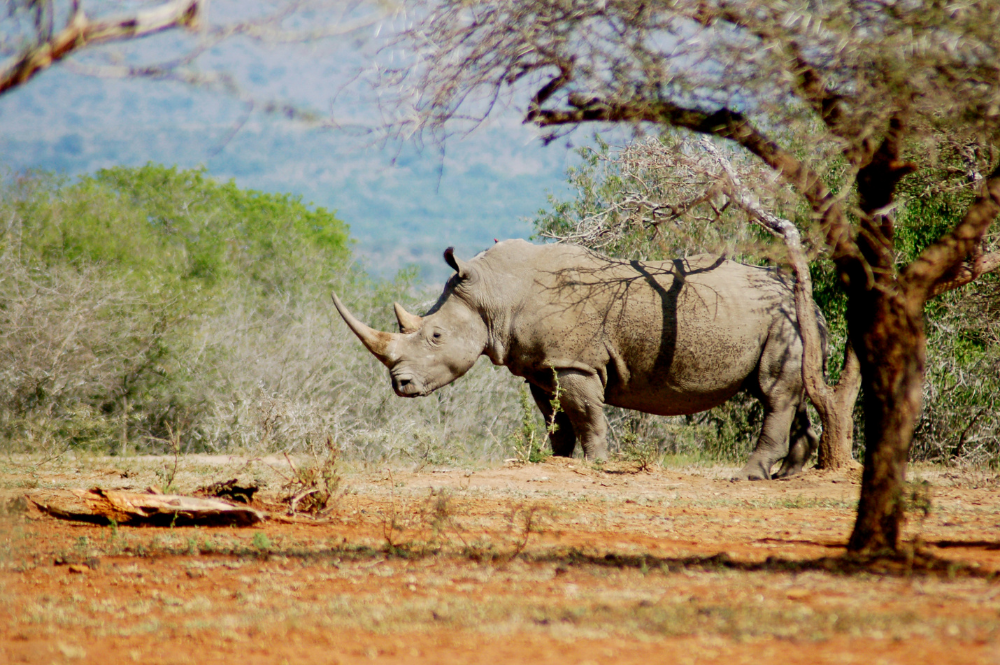A groundbreaking investigation into a rhino poaching network in South Africa had a major development this week, when high-ranking rhino horn trafficker, Francis Kipampa, was sentenced to 18 years for money laundering offences relating to rhino poaching. The sentence follows an intensive multi-year investigation that tracked illicit financial flows to expose a complex criminal network. It is the first time an individual has been successfully prosecuted for their role in the illegal wildlife trade linked to serious financial offenses.
Led by the South African Police Service’s (SAPS) Directorate for Priority Crime Investigations (DPCI), a multi-disciplinary team of South African law enforcement agencies, working with KPMG South Africa and supported by our team at Save the Rhino, the investigation – codenamed Project Blood Orange – highlights the power of financial forensics in dismantling wildlife crime networks.
At Save the Rhino International, we aren’t investigators. But, upon hearing about the situation, we wanted to use our expertise the best way we could: providing and sourcing funding to ensure a thorough investigation. Below is the story of what’s happened so far.
Unraveling the Network Behind Rhino Horn Trafficking
The roots of Project Blood Orange are tied to the tragic assassination of Lt-Col Leroy Bruwer in 2020. A highly experienced officer in SAPS DPCI, Bruwer had gained invaluable insights into a notorious rhino-poaching syndicate. At the time, the lead suspect was the notorious Petrus Sidney Mabuza. After Lt-Col Bruwer’s murder, the investigation into the syndicate continued, requiring complex research by KPMG South Africa into illicit money flows that linked multiple levels of the criminal network and their roles in rhino poaching and horn trafficking.
As our Grants Lead, Cathy Dean MBE, explains, “By following the money, we’ve taken a deep dive into the layers of a complex criminal network, using this evidence to expose and disrupt illegal activity.”
Mabuza himself was killed in June 2021, and the investigation might have ended there, had it not been for more evidence gathered by the Project Blood Orange team.
Charges and Convictions
In 2023, Francis Kipampa was arrested and charged with multiple offences, including conspiring to traffic rhino horns, money laundering approximately R1,000,000 in proceeds from rhino horn deals, and violating South Africa’s Immigration Act. After reaching a plea deal with the State on 15 January 2025, Kipampa was sentenced to 18 years. Fifteen additional accomplices tied to the case are set to appear in court soon.
The Mpumalanga Provincial Head of the DPCI, Major General Nico Gerber, was delighted with both the arrest and the sentence, stating, “The Hawks in Mpumalanga will do all it can to arrest and ensure conviction of those on the wrong side of the law. We will go after the proceeds generated through illegal activities with all the means at our disposal.”
The Role of Collaboration
Project Blood Orange serves as a powerful example of what can be achieved when governments, NGOs, and private sectors unite to tackle serious organised crime. Led by Brigadier Danie Hall, Project Blood Orange involves a multi-disciplinary team, including the Crime Intelligence Head Office, South African National Parks, the Financial Intelligence Centre, the National Prosecuting Authority, the Asset Forfeiture Unit, and the South African Government’s Department of Forestry, Fisheries and the Environment.
To support the project, Save the Rhino provided funds directly, as well as securing funding from the UK Government through the Illegal Wildlife Trade Challenge Fund, Ardea Cares, MalaMala Private Game Reserve & Kirkman’s & Tengile Lodges, Save the Rhino International Inc., The Linbury Trust, The Mark Leonard Trust, The Woodtiger Fund, and an anonymous donor.
Cathy Dean added, “Project Blood Orange showcases the power of financial forensic investigations in uncovering compelling evidence. It’s a game-changer for tackling organised wildlife crime, and we hope similar approaches can be implemented in other jurisdictions. With continued collaboration and innovation, we can protect rhinos and other endangered species from the urgent threats they face.”
Working to Stop Wildlife Crime
We’re committed to ensuring a future where all five rhino species thrive in the wild. Throughout our history, we’ve championed activities that boost rhino conservation and disrupt illegal trade, distributing more than £31 million to projects across Africa and Asia. With your support, we can continue to fund groundbreaking initiatives like Project Blood Orange, protecting rhinos, the places they live and the people around them.








